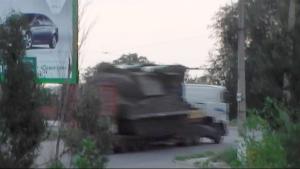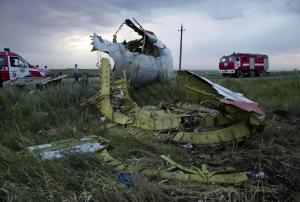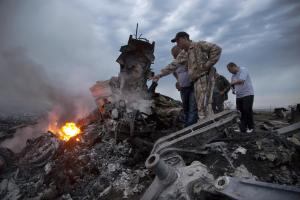SNIZHNE, Ukraine (AP) — It was lunchtime when a tracked launcher with four SA-11 surface-to-air missiles rolled into town and parked on Karapetyan Street. Fifteen hundred miles (2,400 kilometers) to the west, passengers were checking in for Malaysia Airlines Flight 17.
It had been a noisy day in this eastern Ukrainian town, residents recounted. Plenty of military equipment was moving through. But still it was hard to miss the bulky missile system, also known as a Buk M-1. It left deep tread marks in the asphalt as it rumbled by in a small convoy.
The vehicles stopped in front of journalists from The Associated Press. A man wearing unfamiliar fatigues, speaking with a distinctive Russian accent, checked to make sure they weren't filming. The convoy then moved on, destination unknown in the heart of eastern Ukraine's pro-Russia rebellion.
Three hours later, people six miles (10 kilometers) west of Snizhne heard loud noises.
And then they saw pieces of twisted metal — and bodies— fall from the sky.
The rebel leadership in Donetsk has repeatedly and publicly denied any responsibility for the downing of Flight 17.
Sergei Kavtaradze, a spokesman for rebel leader Alexander Borodai, repeated to the AP on Friday that no rebel units had weapons capable of shooting that high, and said any suggestions to the contrary are part of an information war aimed at undermining the insurgents' cause.
Nevertheless, the denials are increasingly challenged by accounts of residents, the observations of journalists on the ground, and the statements of one rebel official. The Ukrainian government has also provided purported communications intercepts that it says show rebel involvement in the shoot-down.
A highly placed rebel, speaking to the AP this week, admitted that rebels were responsible. He said a unit based in the hometown of ousted President Viktor Yanukovych, made up of both Russians and Ukrainians, was involved in the firing of an SA-11 from near Snizhne. The rebel, who has direct access to the inner circle of the insurgent leadership in Donetsk, said that he could not be named because he was contradicting the rebels' official line.
View gallery

FILE - This image made from video provided by the Ukrainian Interior Ministry on Friday, July 18, 20 …
The rebels believed they were targeting a Ukrainian military plane, this person said. Instead, they hit the passenger jet flying from Amsterdam to Kuala Lumpur. All 298 people aboard were killed.
Intercepted phone conversations released by the Ukrainian government appear to back up the contention they were unaware the aircraft was a passenger jet.
In those tapes, the first rebels to reach the scene can be heard swearing when they see the number of bodies and the insignia of Malaysia Airlines.
Ukraine immediately blamed the rebels for the shooting. In an interview in Kiev this week, the Ukrainian counterterrorism chief, Vitaly Nayda, gave the AP the government's version of the events of July 17. He said the account was based on information from intercepts, spies and resident tips.
Nayda laid the blame fully on Russia: He said the missile launcher came from Russia and was operated by Russians. The Russian Foreign Ministry on Friday declined to comment on either charge. Moscow has continually denied involvement in the downing of the plane.
The rebel official who spoke to AP did not address the question of any Russian government involvement in the attack. U.S. officials have blamed Russia for creating the "conditions" for the downing of the plane, but have offered no evidence that the missile came from Russia or that Russia directly was involved.
According to Nayda, at 1 a.m. on July 17 the launcher rolled into Ukraine across the Russian border aboard a flatbed truck. He cited communications intercepts that he would not share with the AP. By 9 a.m., he said, the launcher had reached Donetsk, the main rebel stronghold 125 miles (200 kilometers) from the border. In Donetsk it is presumed to have been off-loaded from the flatbed and started to move in a convoy on its own.
Nayda said the Buk turned back east toward Snizhne. Townspeople who spoke to the AP said it rolled into Snizhne around lunchtime.
View gallery

FILE - In this Thursday, July 17, 2014 file photo, firefighters arrive at the crash site of a passen …
"On that day there was a lot of military equipment moving about in town," recalled Tatyana Germash, a 55-year-old accountant, interviewed Monday, four days after the attack.
Valery Sakharov, a 64-year-old retired miner, pointed out the spot where he saw the missile launcher.
"The Buk was parked on Karapetyan Street at midday, but later it left; I don't know where," he said. "Look — it even left marks on the asphalt."
Even before the plane was downed, the AP had reported on the presence of the missile launcher in the town July 17.
Here is what that dispatch said: "An Associated Press reporter on Thursday saw seven rebel-owned tanks parked at a gas station outside the eastern Ukrainian town of Snizhne. In the town, he also observed a Buk missile system, which can fire missiles up to an altitude of 22,000 meters (72,000 feet)."
AP journalists saw the Buk moving through town at 1:05 p.m. The vehicle, which carried four 18-foot (5.5-meter) missiles, was in a convoy with two civilian cars.
The convoy stopped. A man in sand-colored camouflage without identifying insignia — different from the green camouflage the rebels normally wear — approached the journalists. The man wanted to make sure they had not recorded any images of the missile launcher. Satisfied that they hadn't, the convoy moved on.
About three hours later, at 4:18 p.m., according to a recording from an intercepted phone call that has been released by Ukraine's government, the Buk's crew snapped to attention when a spotter called in a report of an incoming airplane.
View gallery

FILE - In this Thursday, July 17, 2014 file photo, people inspect the crash site of a passenger plan …
"A bird is flying to you," the spotter tells the rebel, identified by the Ukrainians as Igor Bezler, an insurgent commander who the Ukrainian government asserts is also a Russian intelligence officer.
The man identified as Bezler responds: "Reconnaissance plane or a big one?"
"I can't see behind the clouds. Too high," the spotter replies.
The rebel official who spoke to the AP about the incident said that Bezler commanded another fighter, code-named Sapper, who was the ranking rebel officer with the missile launcher at the time.
According to the rebel official, Sapper led a rebel unit, about half of which was made up of men from far eastern Russia, many from the island of Sakhalin off Russia's Pacific coast.
Sapper is from the nearby town of Yenakiieve, he said. The town also happens to be the home of the former president, Yanukovych.
Sapper could not be reached for comment; his real identity is not known. Bezler, contacted on Friday by the AP, denied any connection to the attack on the plane. "I did not shoot down the Malaysia Airlines plane. I did not have the physical capabilities to do so," he declared.
According to the account of the rebel official, however, Sapper had been sent that day to inspect three checkpoints — in the towns of Debaltsevo, Chernukhino and Snizhne, all of which are within a 20-mile (30-kilometer) radius of where the plane went down. At some point in these travels, he joined up with the convoy accompanying the missile launch system.
At about 4:20 p.m., in the town of Torez, six miles (10 kilometers) west of Snizhne, residents heard loud noises. Some reported hearing two blasts, while others recall only one.
"I heard two powerful blasts in a row. First there was one, but then after a minute, a minute and a half, there was another discharge," said Rostislav Grishin, a 21-year-old prison guard. "I raised my head and within a minute I could see a plane falling through the clouds."
At 4:40 p.m., in another intercepted call released by Ukraine, the man identified as Bezler tells his own superior that the unit had shot down a plane.
"Just shot down a plane. It was Sapper's group. It went down beyond Yenakiieve," the man says.
While the authenticity of the intercept cannot be verified independently, the U.S. Embassy in Kiev said specialists in the intelligence community have deemed it authentic.
As for the Buk, Nayda said, intelligence suggests it went back on the move shortly after the attack.
That very night, he said, it crossed the border, back into Russia.
___
Leonard reported from Kiev. Other AP correspondents in eastern Ukraine assisted in this report.
Details emerge about day MH17 was downed

Ukraine rebels continue to deny involvement, but AP accounts connect many of the dots.
Role of man code-named 'Sapper'